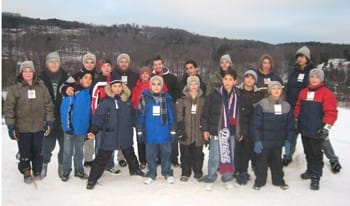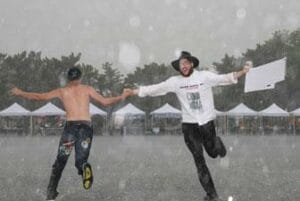MONTICELLO, NY – JANUARY 16, 2008
Seventy years of oppression and indoctrination can wipe out a lot of memories. For some kids of parents who left the former Soviet Union for America, even words like “Jewish” and “Torah” and Shabbos may be shrouded in mystery.
But during a week in the Catskills last month, a group of boys aged 9-14 created their own Jewish memories even as they enjoyed a dream winter vacation filled with skiing, snow-tubing, and other winter sports at Camp FREE-Gan Israel’s winter camp.
Nine-year-old Matthew Solovey was fired up about attending winter camp even before he arrived. Matthew’s older brother Leonard, 11, was not so sure about all this religious stuff but he found that Camp F.R.E.E. didn’t conform to any stereotypes he may have had.
The Soloveys emigrated from Odessa in 1991. Irene Solovey, the boys’ mother, says the family keeps kosher and is gradually adding Jewish practices to their lives while competing with public school, video games and American culture. Camp F.R.E.E., she said, gives her kids the chance to be “very gently introduced [to Judaism] so that they can consciously comprehend it and make a conscious decision.”
A project of Friends of Refugees of Eastern Europe, the winter camp is one of several year-round activities for public school children like shabbatons and summer day camp as well as a full high school yeshiva program. Rabbi Benzion Chanowitz, a Chabad shaliach in Monticello, provided camp’s home base in upstate New York.
“They have a good time and the main thing is they’re learning to be proud Jews,” said camp administrator Rabbi Dan Dashevsky. “We want them to feel comfortable in a Jewish environment, make Jewish friends and be part of the Jewish community.”
Tzvi Altein, 22, took some time off from his semicha studies to be a counselor at Camp F.R.E.E. winter camp. He says that a highlight of camp came each evening after formal learning when the boys and the staff got to hang out together and schmooze. “We’d farbreng with the boys, play games, talk and answer questions,” he said.
Some of the boys came from the release time program which permits public school children to leave school early once a week for religious instruction and so had some Jewish education; others knew nothing at all about Judaism, and they had plenty of questions.
Questions like, “What is Torah?” “What is G-d?”
One boy wanted to know if Jews believe in Jesus.
“They came not knowing what to expect,” said head counselor Rabbi Zalman Shuchat, 24 known to campers simply as “Zalman” “but at the end of the week they had a real varemkeit, warmth, toward Yiddishkeit, they saw that Judaism is not something strange and weird but is fun and something they have a connection to.”
Commenting on this winter’s session, director Rabbi Mendel Okunov said, “It’s the many successful experiences like this that encourage us to continue this rewarding work.”
“We don’t force anything on them,” said Altein. “For example, yarmulkes were not required, only during davening and learning, but when they saw that the staff always wore a head covering, the boys started to do it too.”
Several of the boys have brought changes back at home as well: teaching a parent aleph bais asking if food is kosher even, for one of the campers, deciding from now on to observe Shabbos.
Matthew Solovey and fellow camper Sam Kopit, 11, were among those who were already involved in Jewish activities, singing in the popular M Generation Boys Choir, a project of F.R.E.E. in Brighton Beach. The choir is one of FREE’s ongoing programs that support the Russian Jewish community; its stated goal is to help Jewish kids feel the joy of Jewish music and, like camp, is a way to belong.
Irene Solovey said she was just happy to see that her kids at camp were safe, happy, cared for, and spiritually nurtured. “For a mother, if someone cares for her children, this is the best thing she can wish for,” she said.




